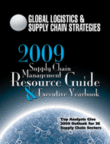
Visit Our Sponsors |
|
|
|
|
|
|
|
|
|
|
|
|
|
|
|
|
|
|
|
|
|
|
|
|
|
|
|
|
|
|
|
|
|
|
|
|
|
|
|
|
|
|
|
|
|
|
|
|
|
|
|
|
|
|
|
|

In October and November 2008, Aberdeen Group benchmarked the supply chain intelligence capabilities at 138 enterprises (Supply Chain Intelligence: A Command and Control Center for Managing Enterprise Performance). The study, published in November, showed that the need to reduce supply chain costs (68 percent citing among the top two pressures), the rising complexity of globalizing supply chains (34 percent citing among the top two pressures) and other factors were driving corporations to focus on improving their supply chain intelligence capabilities. Supply chain intelligence (or business intelligence) takes different forms and can be either operations focused (tactical) or strategic (when the analysis helps analyze complex past trends, forecast future process outcomes, and recommend actions that can have profound impact on the enterprise). This study finds that in order to optimize supply chain performance, companies need to adopt a mix of supply chain intelligence types, including both tactical and strategic elements.
Currently, the lack of communication across departments and with external supply chain partners and the lack of alignment between business goals and IT strategy/capabilities are the top hurdles for companies attempting to optimize their supply chain intelligence capabilities.
The level of supply chain intelligence at an enterprise is dependent on the efficiency of the processes, intensity of internal and supply chain partner collaboration, and on the understanding across the organization that analytics should be embedded in supply chain management processes. At the same time, to enable this integration of analytical approach into both tactical and strategic supply chain decision-making, companies need to ensure visibility into the critical supply chain processes and acquire certain technology tools needed to perform the analysis and present the results to multiple stakeholders.
The following capabilities play a critical role in achieving business performance improvements through the use of supply chain analytics:
• SKU-level visibility into inventory, supply chain milestones and events
• Ability to have access to timely operational data for tactical day-to-day supply chain decision-making
• Ability to perform advanced historical data analysis and forecasting
• Availability of software tools to perform supply chain analysis for strategic decision support
• Executive reporting for supply chain operational metrics and business-level metrics
Among companies that reported the use of software tools for SCI, ranging from spreadsheets and in-house developed tools, to third-party "best-of-breed" software applications, and have already quantified the costs and benefits of these technologies, 63 percent reported having achieved a positive return on investment to date.
The Outlook
In order to leverage supply chain intelligence effectively, companies need to weave the analytical capabilities into all critical processes, from supply chain design and planning to operational tasks. Among this survey's participants:
• 66 percent plan to invest some of their 2009 IT budget into maintaining or purchasing supply chain intelligence software;
• 75 percent are planning to spend some of their IT budget on improving their supply chain intelligence capabilities through in-house software development efforts.
Despite difficult economic times, companies should continue focusing on improving supply chain intelligence capabilities by optimizing processes, collaboration, and technology tools used for this purpose.
RELATED CONTENT
RELATED VIDEOS
Timely, incisive articles delivered directly to your inbox.







